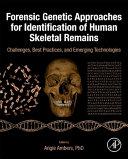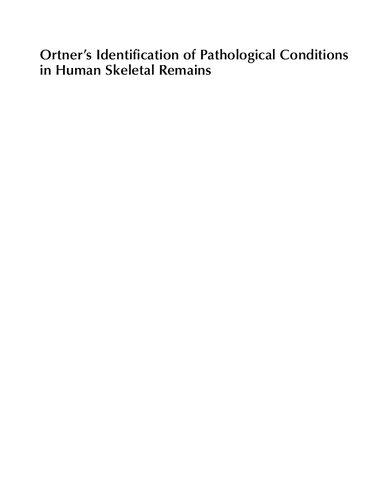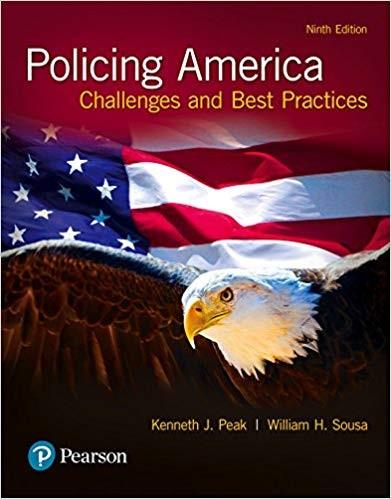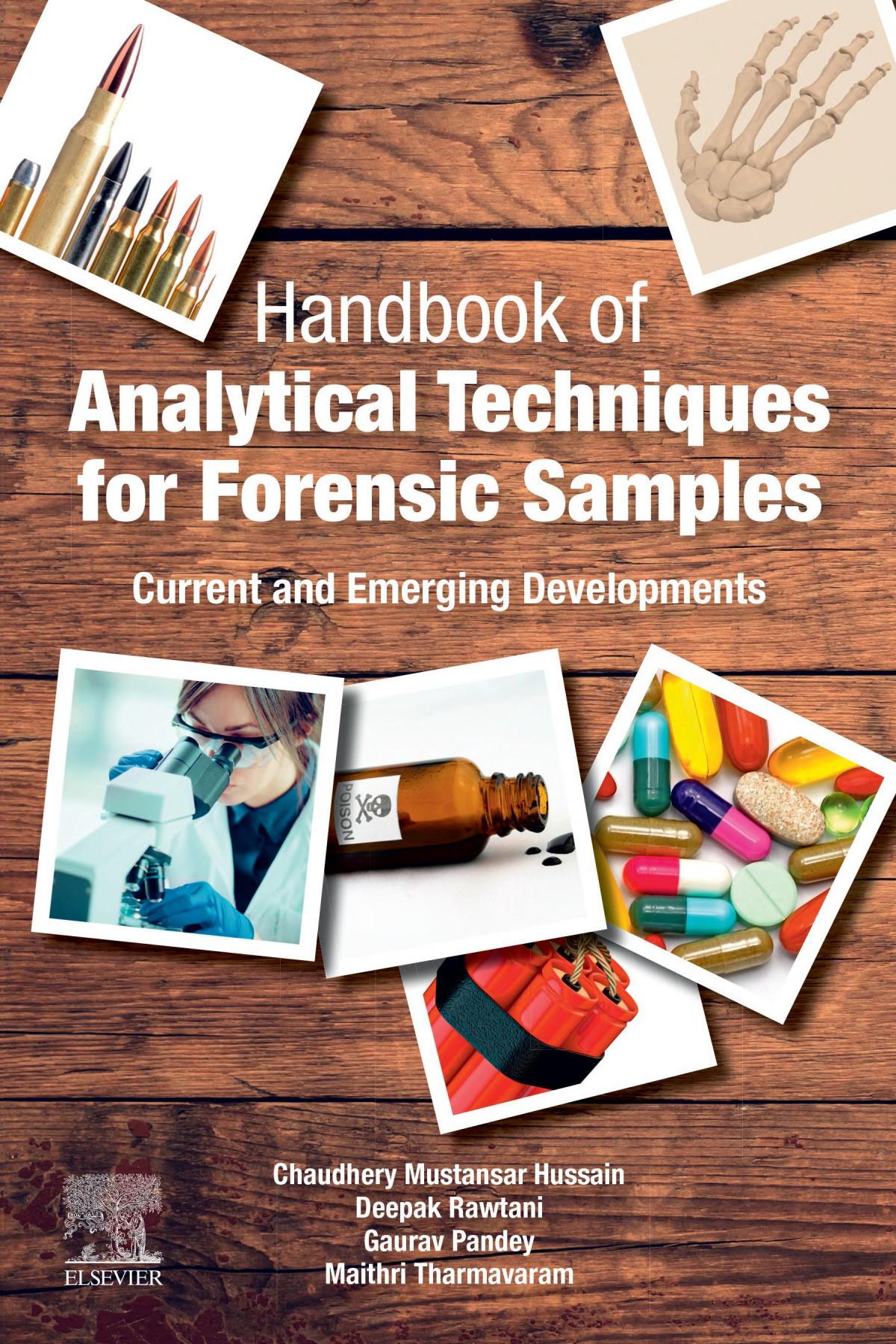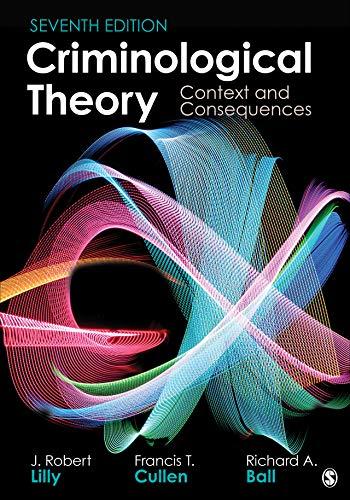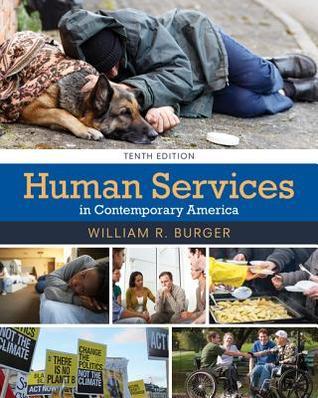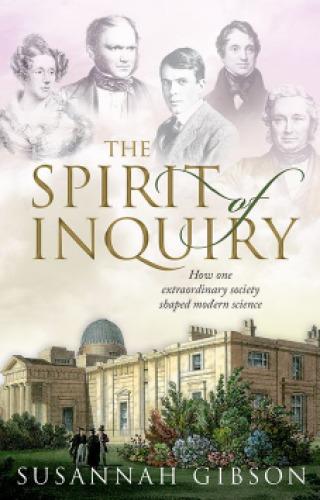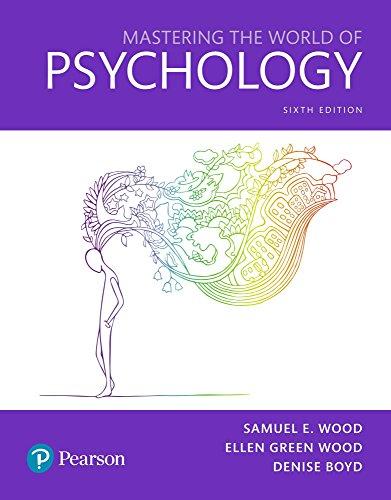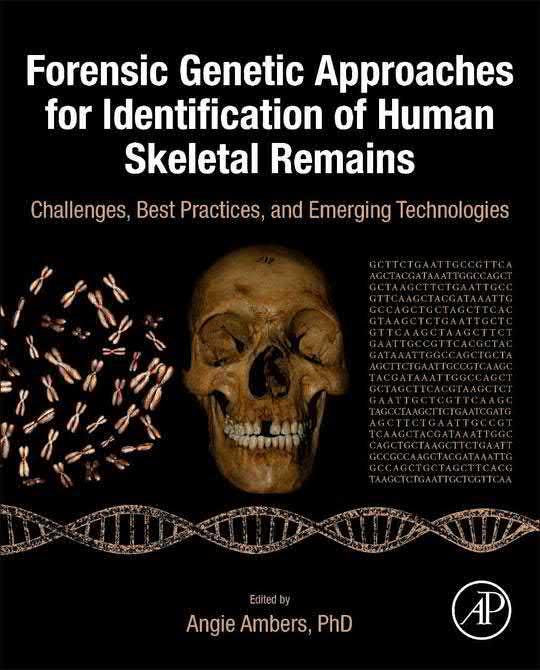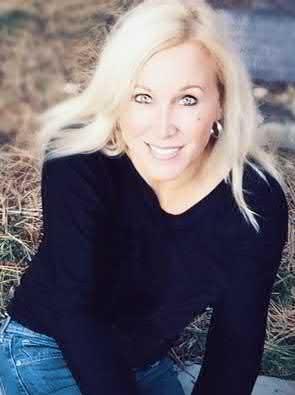Contributors
Angie Ambers PhD Henry C. Lee Institute of Forensic Science; Forensic Science Department, Henry C. Lee College of Criminal Justice and Forensic Sciences, Center for Forensic Investigation of Trafficking in Persons, University of New Haven, West Haven, CT; Institute for Human Identification, LMU College of Dental Medicine, Knoxville, TN, United States
Eric J. Bartelink PhD, D-ABFA Department of Anthropology, Human Identification Laboratory, California State University, Chico, CA, United States
Howard D. Cash CEO Gene Codes Forensics, Inc., Ann Arbor, MI, United States
Thomas J. David DDS, D-ABFO Georgia Bureau of Investigation, Division of Forensic Sciences, Decatur, GA; Department of General Dentistry, Division of Forensics, University of Tennessee Graduate School of Medicine; Institute for Human Identification, LMU College of Dental Medicine, Knoxville, TN, United States
Suni M. Edson PhD Assistant Technical Leader, Past Accounting Section, Armed Forces DNA Identification Laboratory (AFDIL), Armed Forces Medical Examiner System, Dover, DE, United States
Colleen Fitzpatrick PhD Identifinders International LLC, Fountain Valley, CA, United States
Ranjana Grover PhD ANDE Corporation, Waltham, MA, United States
Michael Hennessey BGS, MBA Human Identification Projects, Gene Codes Forensics, Inc., Ann Arbor, MI, United States
Irene Kahline MSFS Past Accounting Section, Armed Forces DNA Identification Laboratory (AFDIL), Armed Forces Medical Examiner System, Dover, DE, United States
Bobby L. LaRue, PhD Department of Forensic Science, Sam Houston State University, Huntsville, TX, United States; Verogen Inc., San Diego, CA, United States
Brandon Letts PhD Federal Bureau of Investigation (FBI) Laboratory, Quantico, VA, United States
James M. Lewis DMD, D-ABFO Department of General Dentistry, Division of Forensics, University of Tennessee Graduate School of Medicine; Institute for Human Identification, LMU College of Dental Medicine, Knoxville, TN; Alabama Department of Forensic Sciences, Madison, AL, United States
Odile Loreille PhD Federal Bureau of Investigation (FBI) Laboratory, Quantico, VA, United States
Murray K. Marks, PhD, D-ABFA Knox County Regional Forensic Center, Department of General Dentistry, Division of Forensic Odontology, University of Tennessee Graduate School of Medicine; National Forensic Academy Outdoor Decomposition Training Facility, University of Tennessee; Department of Pathology; Institute for Human Identification, LMU College of Dental Medicine, Knoxville, TN, United States
Timothy P. McMahon PhD Department of Defense (DoD) DNA Operations, Armed Forces Medical Examiner System, Defense Health Agency, Dover, DE, United States
Darinka Mileusnic-Polchan MD, PhD, D-ABP Knox County Regional Forensic Center, Department of Pathology, University of Tennessee Graduate School of Medicine; Institute for Human Identification, LMU College of Dental Medicine, Knoxville, TN, United States
Stephen Missal CFA Maricopa County Medical Examiner Office, Forensic Science Center; Art Institute of Phoenix, Phoenix, AZ, United States
Contributors
Nicole Novroski PhD Department of Anthropology, Forensic Science Program, University of Toronto Mississauga, Toronto, ON, Canada
Vivek Sahajpal, PhD State Forensic Science Laboratory, Directorate of Forensics Services, Shimla, Himachal Pradesh, India
Richard F. Selden MD, PhD ANDE Corporation, Waltham, MA, United States
Eugene Tan PhD ANDE Corporation, Waltham, MA, United States
Rosemary Turingan Witkowski PhD ANDE Corporation, Waltham, MA, United States
Jodie Ward PhD Centre for Forensic Science, University of Technology Sydney, Sydney, NSW, Australia
Jeremy Watherston PhD Forensic and Analytical Science Service, NSW Health Pathology, Lidcombe, NSW, Australia
Frank R. Wendt PhD Department of Psychiatry, Yale School of Medicine, U.S. Department of Veteran Affairs Connecticut Healthcare System, New Haven, CT, United States
Author’s biographies
Angie Ambers, PhD
Dr. Angie Ambers is an internationally recognized DNA expert and Director of Forensic Genetics at the Institute for Human Identification in the College of Dental Medicine at Lincoln Memorial University (LMU). She also is a Professor of Forensic Genetics in the “Forensic Human Identification” graduate program. She has a PhD in molecular biology (with an emphasis in forensic genetics and human identification) as well as master’s degrees both in forensic genetics and criminology. Dr. Ambers conducts research at the National Forensic Academy (NFA) Cumberland Forest Outdoor Decomposition Facility, a research and training center devoted to studying the effects of environmental exposure on postmortem human remains. In collaboration with a team of board-certified forensic anthropologists and odontologists, her research mission is to develop and optimize methodologies to improve identification efforts in missing person cases, mass disasters, and unidentified human remains (UHR) investigations.
Prior to LMU, Dr. Ambers previously served as Assistant Director of the Henry C. Lee Institute of Forensic Science in Connecticut, a world-class institute that specializes in interdisciplinary research, training, testing, casework consulting, and education in forensic science. She also held an Associate Professor (Forensic DNA) appointment in the Henry C. Lee College of Criminal Justice and Forensic Sciences at the University of New Haven (UNH), teaching forensic biology and DNA analysis methods, in addition to specialty courses on advanced
DNA topics. During this time, she also was a team member with UNH’s Center for Forensic Investigation of Trafficking in Persons. She worked as a forensic geneticist for the University of North Texas (UNT) Center for Human Identification for 8 years and, prior to pursuing her doctorate, was lead DNA analyst and lab manager of UNT’s DNA Sequencing Core Facility. Her doctoral research involved an investigation of methods (e.g., whole-genome amplification, DNA repair) for improving autosomal and Y-STR typing of degraded and low copy number (LCN) DNA from human skeletal remains and environmentally damaged biological materials. Her master’s thesis research included the development and optimization of a DNA-based multiplex screening tool for genetics-based separation of fragmented and commingled skeletal remains in mass graves.
Dr. Ambers specializes in the characterization and identification of contemporary, historical, and archaeological human skeletal remains. Her casework has involved DNA testing of an American Civil War guerrilla scout; several Finnish World War II soldiers; unidentified late-19-century skeletal remains discovered by a construction crew in Deadwood, South Dakota; unidentified skeletal remains of Special Operations soldiers killed during the 1974 Turkish invasion of Cyprus; skeletal remains exhumed from Prague Castle in the Czech Republic; skeletal remains of soldiers from the seven years’ war (1756–63); bone samples purported to belong to a member of Jesse James gang (killed during a bank robbery in 1876); and
the exhumed remains of the wife of a Yale medical school professor. She co-presented a workshop on “Advanced Methods for DNA-based Analysis of Skeletal Remains” at the 26th International Symposium on Human Identification (ISHI), and has been an invited speaker at an international bone workshop/conference in Prague, Czech Republic. In 2017, she traveled twice to India to train scientists from various Indian states and the Maldives Police Service on the processing of bone samples in forensic DNA casework. During her visit to India, she performed autosomal STR analysis on human skeletal remains discovered along a hiking route in the Himalayas (in the northern state of Himachal Pradesh) to assist local officials in the investigation of a missing person case. Additionally, she performed DNA analysis on a female homicide victim recovered from a clandestine grave in New Delhi.
Dr. Ambers’ casework and research have been published in various peerreviewed journals, including Forensic Science International: Genetics (FSI: Genetics), Forensic Science International (FSI), International Journal of Legal Medicine (IJLM), Legal Medicine, BMC Genomics, the Croatian Medical Journal, The Journal of Heredity, and Journal of Biological and Clinical Anthropology (Anthropologischer Anzeiger). Her work has received press in numerous local and national newspapers (including The Washington Times, NBC News, Criminal Legal News, The Root) and has been featured on several podcasts (Truth and Justice, Crime Waves).
Her most recent casework (a collaboration with the Texas Historical Commission) includes DNA analyses of human skeletal remains associated with the French explorer La Salle’s last expedition. This case involved massively parallel sequencing (MPS) of DNA from two adult male skeletons recovered from the La Belle shipwreck, skeletal remains recovered from a mass
grave at Fort St. Louis, and the putative remains of Sieur de Marle. Additionally, Dr. Ambers performed DNA extractions and mitochondrial DNA (mtDNA) sequencing on numerous sets of skeletal remains associated with Spanish royalty and the House of Aragon (recovered from tombs within the Royal Pantheon of San Juan de la Peña archaeological site in Spain). She is currently working on the putative remains of William Townsend Washington, the nephew of former U.S. President George Washington.
In addition to skeletal remains cases and research, Dr. Ambers collaborated with the National Institute of Justice (NIJ) and the Forensic Technology Center of Excellence (FTCoE) to develop and disseminate a formal report on the use of familial DNA searching (FDS) in casework. She is an active cold case consultant, an advocate of postconviction DNA testing, and an educator/advisor on DNA testing or retesting of old, degraded, or challenging evidentiary samples. Dr. Ambers also was the 2017–18 Project Lead on a U.S. State Department grant to combat human trafficking in Central America through the application of forensics. As part of the program objectives, she traveled to three Northern Triangle countries (Guatemala, El Salvador, Honduras) to perform gap assessments of government laboratories and train personnel in forensic DNA analysis, with the goal of promoting quality casework methods based on ISO 17025 standards. As Project Lead, she helped in training forensic DNA scientists at the Instituto Nacional de Ciencias Forenses de Guatemala (INACIF, the National Institute of Forensic Sciences of Guatemala) in Guatemala City, Guatemala; the Instituto de Medicina Legal (Institute of Legal Medicine) in San Salvador, El Salvador; and the Instituto de Medicina Forenses: Centro de Medicina Legal y Ciencias Forenses (the Institute of Forensic Medicine: Center of Legal Medicine and Forensic Sciences) in Tegucigalpa, Honduras.
In addition to providing both lecture and tactile training on DNA analysis methods to Northern Triangle laboratories, Dr. Ambers was part of a consortium to help these countries develop and maintain forensic DNA databases to assist in the identification of missing persons related to human trafficking.
Eric Bartelink, PhD, D-ABFA
Dr. Eric J. Bartelink is a Professor in the Department of Anthropology and Co-Director of the Human Identification Laboratory at California State University, Chico. He received his BS in Anthropology at Central Michigan University (1995), his MA in Anthropology at California State University, Chico (2001), and his PhD in Anthropology at Texas A&M University (2006). He is a board-certified Diplomate of the American Board of Forensic Anthropology (ABFA).
Dr. Bartelink’s interests are in forensic anthropology and bioarchaeology, and he has conducted research focused on skeletal trauma, taphonomy, paleopathology, and stable isotope analysis. He maintains an extensive research program focused on central California bioarchaeology and also has conducted work in American Samoa. Previously, he assisted with the excavation of mass graves in Bosnia-Herzegovina through the United Nations International Criminal Tribunal for the Former Yugoslavia, and also assisted in the identification of victims from the World Trade Center 9/11 disaster.
He has published articles in Journal of Forensic Sciences, Forensic Science International, Forensic Sciences Research, American Journal of Physical Anthropology, Journal of Archaeological Science, International Journal of Osteoarchaeology, International Journal of Paleopathology, Journal of Archaeological Method and Theory, Archaeometry, and California Archaeology. He is also a co-author on the books Forensic Anthropology: Current Methods and Practice (Elsevier, 1st and 2nd editions), Essentials of Physical
Anthropology 10e (Cengage), Introduction to Physical Anthropology 15e (Cengage), and a coeditor on New Perspectives in Forensic Human Skeletal Identification (Elsevier). Dr. Bartelink teaches courses in introductory physical anthropology, as well as forensic science, human osteology, forensic anthropology, bioarchaeology, and statistics. He is a Fellow of the American Academy of Forensic Sciences (AAFS), and a member of the American Association of Physical Anthropologists (AAPA), Society of American Archaeology (SAA), Paleopathology Association (PPA), and the Society for California Archaeology (SCA). He is a past Board Member and President of the American Board of Forensic Anthropology (ABFA), and former Board Member of the American Academy of Forensic Sciences (AAFS), the Scientific Working Group for Forensic Anthropology (SWGANTH), and the Organization of Scientific Area Committees (OSAC) Anthropology Subcommittee.
Howard Cash, CEO
Howard Cash is the CEO of Gene Codes Corporation. Before venturing into the field of computational biology, he studied music at the University of Pennsylvania and also served as Assistant Conductor with the Pennsylvania Opera Theater, Psychoacoustics at Stanford.
At the forefront of commercial bioinformatics since 1984, Cash was Senior Engineer and headed the Expert Systems Group at IntelliGenetics, Inc., where many seminal biotechnology software tools were developed. One of the programs he worked on during this period was key to the original sequencing of the human immunodeficiency (HIV/AIDS) virus. In 1988, he founded Gene Codes Corporation, one of the most successful bioinformatics companies in the world. He designed and developed the Sequencher program used in thousands of academic and commercial DNA sequencing labs in more
Author’s biographies
than 90 countries. Specialized versions of Sequencher have been developed for applications including human identification, mitochondrial DNA (mtDNA) typing, therapy review based on HIV strain dominance in AIDS patients, and rapid characterization of H1N1 flu variants from the 2009 worldwide outbreak.
After the 9/11 terrorist attacks, New York City asked Cash to develop DNA analysis software for identifying the remains of those killed at the World Trade Center. A daunting task from a technical standpoint—with a database and set of analysis tools integrating primary sequence, SNP, and STR data— it also raised ethical and legal issues. One result of this effort was the Mass-Fatality Identification System, or M-FISys (pronounced like emphasis). Cash has applied bioinformatics to numerous other humanitarian genetic identification projects, including (1) the Boxing Day Tsunami; (2) the sexual assault and murder of hundreds of women in Juarez, Mexico; (3) postconflict identifications from Guatemala’s 35-year civil war; and (4) an international collaboration to detect and interdict child trafficking.
Thomas David, DDS, D-ABFO—Forensic Odontologist
Dr. Thomas J. David earned his dental degree from Emory University School of Dentistry in 1977. He has maintained a dental practice since that time in the Atlanta metropolitan area. He is a member of the American Society of Forensic Odontology (ASFO), a Fellow of the American Academy of Forensic Sciences (AAFS), and a Diplomate of the American Board of Forensic Odontology (ABFO). Dr. David has served as Chair of the Odontology Section of AAFS and President of the ABFO, as well as on the Editorial Board of the Journal of Forensic Sciences (JFS). He has authored articles in various periodicals (including the JFS) and a number of textbook
chapters (including multiple editions of the Manual of Forensic Odontology and the 2nd Edition of Forensic Dentistry). He also coedited the book Forensic Odontology: Principles and Practice, which was released in 2018. Dr. David is a consultant in Forensic Odontology to the Georgia Bureau of Investigation (GBI), Division of Forensic Sciences and the State of Georgia Medical Examiner’s Office. He also holds a faculty appointment as a Clinical Assistant Professor in the Department of General Dentistry of the Graduate School of Medicine at the University of Tennessee Health Science Center. He provides instruction for the Forensic Odontology Fellowship program and the University of Tennessee biennial Symposium “All That Remains.”
Suni M. Edson, PhD
Dr. Suni M. Edson started her career in science working in a research laboratory while an undergraduate at Texas Tech University. She worked with graduate students and professors on projects ranging from the insertion of traceable genetic material into cotton seeds to the analysis of transposable elements in Peromyscine rodents. Upon graduation with a BS in Biology, Dr. Edson migrated to Syracuse, New York to attend the State University of New York (College of Environmental Science and Forestry). She spent several of the snowiest-winters-onrecord traipsing through Adirondack Park to study the introgressive hybridization of Mallards and Black Ducks. The project involved the collection of blood samples from numerous pairs of ducks and their broods, and subsequent RFLP analysis to determine if these dabbling ducks are truly “monogamous” in their pair bonds.
After earning her MS degree, Dr. Edson moved to the Washington, D.C. area to work briefly at the Lombardi Cancer Center at Georgetown University. There she spent time
as a research assistant examining human leukocyte antigen (HLA) genes, garnering five publications as a coauthor. During the first few months of work at Georgetown, she answered an ad in the paper for a research assistant at the Armed Forces DNA Identification Laboratory (AFDIL) in Rockville, Maryland. While she was not hired for that position, she did become a DNA technician in the Past Accounting Section, and thus began her almost 22-year tenure with the laboratory.
Dr. Edson moved from DNA technician to DNA analyst to supervisory DNA analyst in the short span of 3.5 years. She remained a productive supervisor for 9 years before transitioning in 2010 to her current role of assistant technical leader. During the time as a supervisor, she returned to her researcher roots and started to examine the success of DNA testing of different skeletal elements. While research is not her primary role, Dr. Edson has published over 20 peerreviewed publications and book chapters regarding DNA testing of human remains and the intricacies surrounding human identification. She has presented at numerous professional conferences in the United States and internationally. In 2015, she was accepted into a PhD program at Flinders University in South Australia. Her dissertation on improving the extraction of DNA from skeletal materials generated a novel method using GC/ MS to analyze skeletal materials for inhibitors and materials deposited on the remains peri- and postmortem, as well as nine publications to date. Dr. Edson graduated in 2019 and remains in her position at AFDIL, where she continues to examine trends in DNA testing of skeletonized human remains.
Colleen Fitzpatrick, PhD
Dr. Colleen Fitzpatrick is widely recognized as the founder of modern Forensic Genetic Genealogy (FGG). She pioneered the
use of genetic genealogy (Y-STR and autosomal SNP analysis) for generating forensic intelligence on cold cases that are sometimes decades old. Dr. Fitzpatrick’s expertise includes the application of whole-genome sequencing to low level and highly degraded DNA, enabling identifications that otherwise are believed to have gone beyond the reach of modern technology.
Dr. Fitzpatrick has twice been awarded fifth place in the prestigious international Gordon Thomas Honeywell Cold Case Hit of the Year competition—first in 2018 for solving the 1992–93 Phoenix Canal Murders (out of 61 entries from 14 countries). This was the first case solved using genetic genealogy (2015). Her second Cold Case Hit award came in 2020 for her work on the 1991 Sarah Yarborough Homicide (out of 50 entries from 20 countries). This was the first case where genetic genealogy was used to generate investigative leads (2011).
In addition to her work in forensic identification, Dr. Fitzpatrick had been a key member of the teams that have exposed two international Holocaust literary frauds. She has also served as the forensic genealogist on several historical projects including the identification of the unknown child on the Titanic and the Abraham Lincoln DNA Project. Her collaborations include the Armed Forces DNA Identification Laboratory (AFDIL), the U.S. Army Casualty and Mortuary Affairs Office, the Simon Wiesenthal Center in Jerusalem, the University of Arizona, the University of Adelaide, the Henry C. Lee Institute of Forensic Science, and other noted professional organizations. She is a member of the Vidocq Society and an associate member of the American Academy of Forensic Science (AAFS).
Dr. Fitzpatrick is the founder of Identifinders International and co-founder of the DNA Doe Project. She lectures widely in the United States, Canada, Europe, Australia,
and New Zealand. She has appeared in hundreds of newspapers and magazines (both domestically and internationally), and on international radio and television programs. She is the author of three books: Forensic Genealogy, DNA & Genealogy, and The Dead Horse Investigation: Forensic Photo Analysis for Everyone.
Ranjana Grover, PhD
Dr. Ranjana Grover is Vice President of Molecular Biology at ANDE Corporation. She received a BS in Zoology (summa cum laude), an MS in Genetics, and a PhD in Molecular Human Genetics from Delhi University. She is an expert in the field of developing rapid, highly multiplexed PCR assays for diverse applications ranging from human identification to in vitro diagnostic assays for human diseases. Dr. Grover has worked in a high-throughput human genetics research laboratory exploring the genetics of complex traits and has a strong background in statistical methods related to molecular genetics. She received postdoctoral training at Johns Hopkins University and then joined the Henry M. Jackson Foundation, where she worked on identifying genetic and epigenetic markers related to Down syndrome, traumatic brain injury, and the toxic effects of metals employed in bullets. While working on these projects, she received several Department of Defense (DoD) research grants and developed expertise in highly advanced next-generation sequencing (NGS) technologies and in second-generation sequencing analysis.
Michael Hennessey, MBA
Mr. Hennessey was the onsite Project Manager for Gene Codes Forensics (GCF) during the identification of victims of the 9/11 terrorist attacks in 2001. For 3 years after the attacks, he reported daily to the Office of Chief Medical Examiner (OCME)
in New York City and provided operational consulting expertise on the World Trade Center identification project. In 2005, Mr. Hennessey also served on the DNA Subcommittee of the Thailand Tsunami Victim Identification Center in Phuket, Thailand. He has helped lead Mass Fatality Identification System (M-FISys) customer training for users in Guatemala, Kenya, El Salvador, Costa Rica, Libya, Israel, Mexico, and Saudi Arabia. Additionally, Mr. Hennessey has conducted human identification workshops at national and international forensics meetings, published peer-reviewed journal articles, and serves on the Scientific Advisory Board of the Forensic Anthropology Foundation of Guatemala (FAFG). He has a Master’s of Business Administration (MBA) from the University of Michigan with a concentration in operations management.
Irene Kahline, MS
Irene Liunoras Kahline received her Bachelor of Science (BS) in Biochemistry at Florida State University. Following her undergraduate studies, she worked in a research lab studying the evolution and phylogeny of shark and ray DNA. During her time in the research lab, she decided to pursue a career in forensic DNA. She moved to the Washington, D.C. area to obtain her Master of Forensic Science in Forensic Molecular Biology at George Washington University. While pursuing her master’s degree, she interned with the research department (now Emerging Technology section) at the Armed Forces DNA Identification Laboratory (AFDIL).
Irene has steadily moved through different positions at AFDIL from research intern to DNA technician to DNA analyst, and now as a supervisory DNA analyst for the Past Accounting Section. She is proficient in mitochondrial DNA (mtDNA) Sanger
sequencing, next-generation sequencing (NGS) of whole-genome mitochondrial DNA, autosomal STR typing, and Y-STR technologies working on dried skeletal remains from past military conflicts. Her dedication to the mission of AFDIL was so immense that she agreed to move to Dover, Delaware from the Rockville, Maryland location.
Bobby LaRue, PhD
Dr. Bobby LaRue earned a PhD in Molecular Genetics from the University of North Texas (UNT) and completed an Intelligence Community postdoctoral fellowship in which he studied the feasibility of small-amplicon, di-allelic markers for forensic applications. Dr. LaRue recently left his position as an Associate Professor of Forensic Science at Sam Houston State University (SHSU) to accept a position in private industry (with Verogen, Inc.).
Brandon Letts, PhD
Dr. Brandon Letts is a Research Biologist at the FBI Laboratory in Quantico, Virginia. He possesses a BS in Forensic Science from Baylor University and a PhD in Genetics from Pennsylvania State University. His current duties include research and validation of new techniques and technologies for implementation at the FBI and troubleshooting laboratory issues arising in casework. Prior to becoming a research biologist, he was a forensic examiner for the U.S. Army Criminal Investigation Laboratory (USACIL) and both a forensic examiner and technical specialist for the FBI.
Dr. Letts has a background in ancient DNA, having performed his dissertation work under the supervision of Dr. Beth Shapiro, a leader in the study of ancient DNA and molecular evolution. In her lab, he analyzed hundreds of samples up to 100,000 years old and used the information he obtained to investigate the effects of en-
vironmental changes on animal populations. His research interests continue to revolve around the retrieval and analysis of DNA from highly degraded samples.
James M. Lewis, DMD, D-ABFO
Dr. James M. Lewis earned his dental degree from the University of Alabama School of Dentistry (Birmingham) in 1985. He maintained a general dentistry practice exclusively in Madison, Alabama from 1986 to 2018. Dr. Lewis completed a fellowship in Forensic Odontology from the Center for Education and Research in Forensics at the University of Texas Health Science Center at San Antonio in 2001. As a boardcertified forensic odontologist, he assisted in victim identification following the World Trade Center attack in New York City and, since 2003, has served as a consultant to the Alabama Department of Forensic Sciences (ADFS) and a volunteer to the Alabama Office of Emergency Preparedness in relation to its mass disaster response group.
Dr. Lewis is a Fellow of the Odontology Section of the American Academy of Forensic Sciences (AAFS), became boardcertified by the American Board of Forensic Odontology (ABFO) in 2008, has served on the Board of Governors of the American Society of Forensic Odontology (ASFO), and became President of the organization in 2012. For the American Board of Forensic Odontology (ABFO), he served as member and Chair of the Dental Age Assessment Committee (2008–20); as a member of the Certification and Examination Committee (2011–15); Bitemark Evidence and Patterned Injury Committee (2008–15; 2017–19); and currently holds the office of ABFO President. He is currently appointed to the Odontology Subcommittee of the Organization of Scientific Area Committees (OSAC) for Forensic Science with the National Institute of Standards and Technology (NIST).
Dr. Lewis previously held the position of Director of Forensic Dentistry (Division of Forensics) in the Department of General Dentistry at the University of Tennessee Graduate School of Medicine. He is currently Director of Forensic Odontology at the Institute for Human Identification in the College of Dental Medicine at Lincoln Memorial University (LMU). He is also a professor of Forensic Dentistry at LMU and an instructor for the National Forensic Academy (NFA) in Oak Ridge, Tennessee. He has edited numerous textbooks, authored textbook chapters, and published a variety of articles in peer-reviewed journals on forensic odontology.
Odile Loreille, PhD
Dr. Odile Loreille holds a PhD in Paleogenetics from the University of Claude Bernard in Lyon, France. During her PhD research and two postdoctoral positions, she specialized in extracting and analyzing DNA from extinct species (cave bears, cave lions), mummies, and decades-old parasites. When she joined the Armed Forces DNA Identification Laboratory (AFDIL) in 2004, she used her expertise in ancient DNA (aDNA) analysis to tackle AFDIL’s most challenging identification effort—the so-called Punchbowl samples, a large set of Korean War remains buried as unknown in the National Memorial Cemetery of the Pacific. After optimizing the DNA extraction protocol with a technique that is now used in many forensic laboratories around the world, she introduced next-generation sequencing (NGS) to the laboratory. Using Illumina technology and hybridization capture, she successfully retrieved mitochondrial DNA (mtDNA) from these human remains.
Dr. Loreille is now a Research Biologist in the DNA Support Unit at the FBI Laboratory and continues to work on improving techniques for the FBI’s DNA Casework Unit. The focus of her current research is the
retrieval of nuclear DNA from decades-old human rootless hair shafts and characterization of single nucleotide polymorphisms (SNPs) to identify the hair’s owner. Another research interest of hers is DNA analysis of remains attributed to historical figures. These projects involved the tentative identification of W.A Mozart, Friedrich Schiller, the unknown child of the Titanic, Everett Ruess, The Romanov family (including the two children found in 2007), Sir George Yeardley, and Henry Rathbone.
Dr. Loreille has been a member of the International Society for Forensic Genetics (ISFG) for the past 13 years and has published 30 peer-reviewed research articles or book chapters. Her 2007 publication on DNA extraction using total demineralization has been cited more than 250 times, and her 2018 research article on the DNA analysis of a 4000-year-old Egyptian mummy is one of the most-read articles of the journal.
Murray K. Marks, PhD, D-ABFA
Dr. Murray Marks is the board-certified forensic anthropologist for the Regional Forensic Center (RFC) in Knoxville, Tennessee, and for the Hamilton County Medical Examiner’s Office in Chattanooga. In these respective appointments, he performs recovery, biological assessment, skeletal trauma, and identification casework on human remains. Dr. Marks also serves as Director of Forensic Anthropology at the Institute for Human Identification in the College of Dental Medicine at Lincoln Memorial University (LMU). Additionally, he is a Professor of Forensic Anthropology and Human Identification at LMU and manages the National Forensic Academy (NFA) Outdoor Decomposition Training Facility, where he teaches archaeological clandestine grave recovery methods and forensic anthropology. Dr. Marks previously held an Associate Research Professor appointment in the Graduate School of Medicine’s Department
of General Dentistry (Division of Forensics) at the University of Tennessee Medical Center Knoxville (UTMCK), instructing students in the M.S. program on forensic dentistry, head and neck anatomy, mineralized tissue histology, and research methods. He currently holds adjunct visiting professorships in the Department of Anatomy and Neurobiology at Boston University and in the Department of Anatomy at the University of Western Australia.
Timothy McMahon, PhD
Dr. Timothy McMahon received his PhD in Biomedical Sciences from the School of Public Health at the University of Albany, New York. Dr. McMahon’s graduate studies and postdoctoral research were performed in the division of Infectious Disease and Immunology at the New York State Department of Health. His research included the identification and interaction of the Human Cytomegalovirus Helicase-Primase replication proteins and a pro-death late transcript that caused cell death in infected cells. From 2002 to 2007, Dr. McMahon established the U.S. Department of Defense (DoD) DNA Operation’s Quality Control and Validation section; in this role, he was responsible for developing and forensically validating all new human remains DNA identification instrumentation, reagents, and testing procedures.
In March 2007, Dr. McMahon joined Applied Biosystems, where he established the first commercial Global DNA Forensic Professional Service organization whose primary function was to design and establish new DNA laboratories (as well as aid local, state, and federal crime laboratories with implementing new forensic DNA technologies and instrumentation). During his time at Applied Biosystems, Dr. McMahon was responsible for developing a state of the art, fully automated Criminal Casework
Line that allowed for the processing of 640 crime scene samples per day, developed an automated differential extraction line, and performed over 200 validations for both North American and international crime laboratories. In February 2012, Dr. McMahon returned to the Armed Forces Medical Examiner System (AFMES) as the Chief of Forensic Services, where his role as the scientific subject matter expert was to advise, guide, and help maintain the AFMES as a leader in the forensic community. He oversaw all aspects of casework performed at DoD DNA operations while directing and carrying out projects and programs to develop innovative advances in DNA-based forensic testing methods. In this role, Dr. McMahon also established AFMES-AFDIL as the first laboratory in the United States to develop and implement a forensically validated next-generation sequencing (NGS) method for human remains identification.
In 2017, Dr. McMahon became the first civilian Director of the DoD DNA operations section of the AFMES, where he is in charge of the Armed Forces DNA Identification Laboratory (AFDIL) and the Armed Forces Repository of Specimen Samples for the Identification of Remains. Dr. McMahon oversees over 150 scientists and is in charge of all human remains DNA scientific initiatives in support of the AFMES’ primary mission to identify fallen U.S. Service members from present-day operations and from past conflicts.
Darinka Mileusnic-Polchan, MD, PhD, D-ABP
Dr. Darinka Mileusnic-Polchan is a graduate of the University of Rijeka Medical School in Croatia. After earning her medical degree, she graduated from Loyola University’s Neuroscience Graduate Program in Chicago, Illinois. She completed her training in anatomic pathology
in the Department of Pathology, Loyola University Stritch School of Medicine. Dr. Mileusnic completed forensic pathology training at the Cook County Office of the Medical Examiner in Chicago, Illinois, subsequently receiving board certification in Anatomic and Forensic Pathology. Upon completion, she accepted the position of Assistant Medical Examiner for the Cook County Office of the Medical Examiner for several years.
In 2002, Dr. Mileusnic-Polchan relocated to Knoxville, Tennessee, where she continued the same line of forensic casework in the Department of Pathology at The University of Tennessee Graduate School of Medicine (UTMCK). Currently, she is a Clinical Associate Professor of Pathology at UTMCK. In 2008, she accepted the position of Chief Medical Examiner for Anderson County and Knox County in the state of Tennessee. Dr. Mileusnic is the Medical Director of the Knox County Regional Forensic Center (RFC), which has been accredited by the National Association of Medical Examiners since 2010. She chaired the State Medical Examiner Advisory Council and has been an invited speaker at numerous local and national conferences.
Stephen Missal, MFA, CFA
Stephen Missal graduated with a BFA and MFA in painting from Wichita State University and taught art at the college level for over four decades. He later received his training in forensic art by world-renowned forensic artists Karen T. Taylor and Betty Pat Gatliff. Stephen has specialized in forensic facial reconstruction, and for the past 12 years, he has been the sole forensic facial reconstruction artist working with the Maricopa County Medical Examiner in Arizona (home to Phoenix, Mesa, Scottsdale, and a number of other large cities). In addition, he does forensic reconstructions for several other
Arizona counties, has worked with law enforcement in Georgia, and is certified by the International Association for Identification (IAI). Stephen actively pursues a reconstruction caseload and contributes to educating the public about forensic art through lectures at various colleges and to high school audiences. As an educator, Stephen achieved full Professor at the Art Institute of Phoenix, where he taught with an elite faculty that included two Emmy winners and several nationally recognized illustrators and designers. In 2016, he worked with the NRK (the national Norwegian broadcasting network) as the forensic artist responsible for a new reconstruction of the Isdal Woman, which was included in the documentary about the case which aired that same year. Stephen’s facial reconstruction for this case has since appeared in Die Zeit and many other European news outlets over the past 4 years. Aside from his forensic casework, Stephen’s paintings and drawings can be found in hundreds of private collections nationally. He also has co-authored and illustrated two college textbooks on drawing for animation, and has appeared on local and national cable television demonstrating his forensic art techniques.
Scores of Stephen’s forensic reconstructions can be found in the National Missing and Unidentified Persons System (NamUs), as well as on the Maricopa County Medical Examiner’s site where unknown cases are available for public view.
Nicole Novroski, PhD
Dr. Nicole Novroski is a forensic geneticist and tenure-stream faculty member at the University of Toronto in the Department of Anthropology, with a primary teaching appointment in the Forensic Science Program at the University of Toronto Mississauga (UTM). Her research program focuses on novel and innovative approaches to improve
Author’s biographies
upon current forensic genetic methodologies using traditional (PCR-CE) and MPS-based instrumentation.
Dr. Novroski’s academic accolades include a Bachelor of Science (Hons) in Forensic Science and Biology from the University of Toronto, a Master of Science in Forensic Biology from the University at Albany (SUNY), and a Doctor of Philosophy in Molecular Genetics from the University of North Texas Health Science Center (UNTHSC) at Fort Worth, Texas. Her educational training is largely focused on the exploration of previously uncharacterized genetic markers for improved DNA mixture de-convolution of complex forensic profiles. Dr. Novroski is the recipient of numerous awards including the Forensic Sciences Foundation (AAFS) Douglas M. Lucas Grant, the Connaught New Researcher Award, and the University of Toronto Mississauga Dean’s Award for Excellence (Faculty). She is an associate member of the American Academy of Forensic Sciences (AAFS), an active member of the International Society of Forensic Genetics (ISFG), and an active member of the Scientific Research Honor Society Sigma Xi. Her publication record includes over 20 peer-reviewed manuscripts, 35 scientific communications, public abstracts, and oral presentations as well as two book chapters. She is an ad hoc reviewer for multiple international journals in the areas of human and forensic genetics and serves as a committee member for LabRoots Forensic Science, the Swiss National Science Foundation, and the American Society of Human Genetics “DNA Day” Essay Contest.
Dr. Novroski is passionate about mentoring, volunteerism, and continuing education. She actively holds mentorship positions with the University of Toronto Mississauga Alumni Mentor Program as well as the Women in Science Mentorship Program (as part of an ongoing NSERC CREATE PROMOTE Grant).
Within her laboratory, she has a growing team of undergraduate and graduate trainees. Further, Dr. Novroski assists legal professionals and the public as a forensic DNA expert through her firm 4NGen Consulting. In her limited spare time, she volunteers with the Junior League of Toronto and Toronto Counter Human Trafficking Network and is actively pursuing a degree in Forensic Accounting to further diversify her portfolio.
Vivek
Sahajpal, PhD
Dr. Vivek Sahajpal is Assistant Director of the Directorate of Forensics Services in Himachal Pradesh, India. In addition, he is the Nodal Officer for the Disaster Victim Identification (DVI) Cell at the Directorate of Forensic Services. Dr. Sahajpal has performed forensic DNA analyses in more than 2000 criminal cases, as well as for numerous cases involving the identification of human skeletal remains and disaster victim identification. Dr. Sahajpal attained his master’s degree in Forensic Science from Punjabi University Patiala, and his concern for wildlife conservation and his interest in the field of Wildlife Forensics brought him to the Wildlife Institute of India, Dehradun. At the Wildlife Institute of India, Dr. Sahajpal carried out some of the pioneering research work in the field of Wildlife Forensics and genetics. He earned his PhD in Forensic Science from Punjabi University, Patiala. Identification of human skeletal remains has been an important area of work for Dr. Sahajpal because Himachal Pradesh is a popular tourist destination for hikers, trekkers, and pilgrims—who often go missing at high altitudes in the Himalayas (and along mountain passes and rivers) after getting lost or due to abrupt weather changes. Skeletonized remains are quite often recovered in these cases.
Dr. Sahajpal is currently working on the genetic diversity of different forensically
Author’s biographies
significant markers across populations in India. He has experience in the field of quality assurance (QA) and has worked as the quality manager (QM) for the forensics laboratory in Himachal Pradesh. Dr. Sahajpal is a member of the Indian Hair Research Society and the International Society for Forensic Genetics (ISFG). He serves on the editorial panel of Forensic Science International: Reports, and works for the “DNA Fights Rape—Save the Evidence” program run by Gordon Thomas Honeywell (GTH) Government Affairs. Dr. Sahajpal has authored two books, contributed chapters to four books, and has published 25 research papers in the field of forensic genetics.
Richard Selden, MD, PhD
Dr. Richard Selden is the Founder and Chief Scientific Officer (CSO) of ANDE Corporation. He founded the company in 2004 with a vision to move DNA analysis from sophisticated laboratories to the field, where it could have a daily impact in the military, disaster victim identification (DVI), law enforcement, homeland security, and clinical diagnostic applications. He received his BA degree from Harvard University, MA and PhD degrees in Genetics from the Harvard Graduate School of Arts and Sciences, an MD from Harvard Medical School, and trained as a pediatrician at Massachusetts General Hospital.
Dr. Selden is an author of 45 scientific publications and an inventor on 47 U.S. patents. He was named an honorary member of the Butte County Sheriff’s Department for his humanitarian work on the 2018 Camp Fire, the deadliest wildfire in California history. He has received numerous awards, including the Ernst & Young New England Entrepreneur of the Year award, the R&D 100 Award, the Not Impossible Award, and the 2020 CES Innovation Award. Additionally, Dr. Selden has been the principal investigator (PI) on a broad range of government grants and contracts for clinical and forensic programs.
Eugene Tan, PhD
Dr. Eugene Tan is Senior Vice President of Product Development at ANDE Corporation. He received a BS in Engineering (summa cum laude), an MS in Engineering, and a PhD in Engineering Physics from McMaster University. He has extensive experience in realizing commercial products from early-stage research programs. Among these commercialized products include the ANDE Rapid DNA system, the Genebench FX ruggedized microfluidic electrophoresis system, the DeNOVA 5000HT (Shimadzu) highthroughput DNA sequencer, the XTM-72 (Xanoptix) highly parallel optical transceiver for optical interconnection, and the ML-20 Tunable Laser (CoreTek/Nortel) for telecommunications. At ANDE, Dr. Tan leads the development of Rapid DNA Systems for clinical diagnostics, human forensic identification, and biothreat detection. He is responsible for the design, construction, testing, and optimization of the optical, mechanical, and electrical systems; microfluidic design and testing; and development and optimization of chip fabrication processes. Additionally, he is responsible for the development of data processing and expert system algorithms. Dr. Tan was the Program Manager and Chief System Architect for the Joint DoD/DHS/ FBI ANDE program. He was also the principal investigator on three National Institute of Justice (NIJ) programs on Forensic DNA Research and Development. Dr. Tan is an inventor on 21 ANDE-issued U.S. patents and an author on numerous peer-reviewed publications.
Rosemary Turingan Witkowski, PhD
Dr. Rosemary Turingan Witkowski is Vice President of Forensic Biology at ANDE Corporation. She earned a BS degree in Chemistry (with Honors) at the University of the Philippines (Diliman, Quezon City). After moving to the United States, she earned an MS
and PhD in Chemistry from the University of Massachusetts, Amherst. Her graduate research focused on understanding transcription kinetics and DNA-T7 RNA polymerase structural dynamics through fluorescence resonance energy transfer for which she was recognized at the Biophysical Society Annual Meeting for Student Research Achievement. She joined ANDE in 2006 and has become an integral player in the development, validation, and commercialization of the ANDE Rapid DNA Identification System. She is responsible for developing protocols for analysis of a wide range of sample types for Rapid DNA Identification, including Disaster Victim Identification (DVI) and sexual assault evidence applications. She was directly involved in the identification of the remains of the 2018 California Wildfires, and her expertise in the processing of human remains has led to the resolution of investigative cases at the request of various law enforcement agencies across the country. At ANDE, Dr. Turingan Witkowski is also responsible for the development of biological threat assays and related clinical diagnostics based on highly multiplexed PCR amplification and sequencing methods. She is an author of several peer-reviewed scientific publications and an inventor on a number of U.S. patents.
Jodie Ward, PhD
Associate Professor Jodie Ward is Program Lead for the Australian Federal Police’s National DNA Program for Unidentified and Missing Persons. This multidisciplinary forensic science program serves to aid the investigation of Australia’s current unidentified and missing person cases. In addition, Dr. Ward is Director of the Australian Facility for Taphonomic Experimental Research (AFTER) and an Associate Professor in the Centre for Forensic Science at the University of Technology Sydney. This unique joint appointment facilitates her ability to lead the
research, development, and application of forensic human identification techniques for missing person casework in Australia. Her specific research interests include investigating novel DNA technologies (e.g., massively parallel sequencing, Rapid DNA testing) and their integration with complementary forensic techniques to optimize the identification of unknown deceased persons in humanitarian forensic operations. Previously, she has held forensic DNA specialist roles with the New South Wales (NSW) Forensic and Analytical Science Service and NSW Police Force, and forensic biology academic roles with the National Center for Forensic Studies. She is considered an expert in mitochondrial DNA testing and provides expert evidence for both criminal and coronial cases in Australia.
Dr. Ward holds a PhD in forensic molecular biology from The Australian National University and has postgraduate qualifications in management and higher education. Her career highlight includes being awarded a prestigious 2015 Churchill Fellowship to investigate world-leading DNA identification techniques for missing persons and disaster victims. Following her fellowship, she devised, published, and promoted a number of international best-practice recommendations for the DNA-led identification of human remains, which provide the foundation for the National DNA Program for Unidentified and Missing Persons. She was also recognized as one of Science and Technology Australia’s 2017 Superstars of STEM and Australian Financial Review’s 2018 100 Women of Influence for pioneering a specialist nuclearand mitochondrial DNA identification laboratory in NSW, which was used nationally by police, forensic, and military agencies to identify challenging human skeletal samples from contemporary and historical contexts. She is a member of the Australian Academy of Forensic Sciences (AAFS), Australian and New Zealand Forensic Science Society
Author’s biographies (ANZFSS), and International Society of Forensic Genetics (ISFG), and has been a Board Member of the Missing Persons Advocacy Network since 2018.
Jeremy Watherston PhD
Jeremy Watherston holds a Bachelor of Science in Biomedical Science (Forensic Biology), a Bachelor of Social Science (Psychology), a Master of Forensic Studies in Forensic Science (MForStForSc), and a PhD from the University of Technology Sydney (Australia). An experienced Senior Forensic Biologist currently working in the Case Management Unit at the NSW Health Pathology, Forensic, and Analytical Science Service (Sydney, Australia), he reports on nuclear DNA, Y-chromosome DNA, mitochondrial DNA (mtDNA), and mixed DNA profiles (including probabilistic genotyping analyses), as well as genetic identification using paternity and kinship analysis. Jeremy’s research focuses on the recovery of DNA from compromised human remains and DNAbased disaster victim identification (DVI). His research covers optimal sample selection, collection, and preservation, as well as novel profiling approaches and the application to Rapid DNA platforms. Dr. Watherston’s research is being carried out in collaboration with the Australian Facility for Taphonomic Experimental Research (AFTER).
Frank Wendt, PhD
Dr. Frank Wendt holds a Bachelor’s Degree in Forensic Science (emphasis: biology) from Pennsylvania State University (PSU) and a PhD in Biomedical Science (emphasis: molecular genetics) from the University of North Texas Health Science Center (UNTHSC). His educational training is largely focused on the population genetics of forensically relevant marker types, including insertion–deletion, single nucleotide, and tandem repetitive polymorphisms
in the human genome, including mitochondrial DNA elements. As an undergraduate, Dr. Wendt was involved in the initial testing of Rapid DNA instrumentation now readily employed in law enforcement agencies globally. At UNTHSC, he developed pharmacokinetic-driven machine learning models of response to the synthetic opioid agonist tramadol. This exposure to complex trait genetics brought him to the Yale School of Medicine (Department of Psychiatry) to study the cause and consequence of shared genetic architecture across complex traits related to psychiatry, cognition, and human behavior. Dr. Wendt is currently a National Research Service Award Fellow through the National Institute of Mental Health. His work focuses on understanding sex differences in psychiatric disorders and related comorbidities using sophisticated computational multiomics methods. To understand these differences, Dr. Wendt works primarily with large-scale genetic data as an analyst for the Psychiatric Genomics Consortium Posttraumatic Stress Disorder and Substance Use Disorder Working Groups (PGC-PTSD) and a genetic epidemiologist within the U.S. Department of Veterans Affairs Million Veteran Program.
Dr. Wendt has received numerous prestigious awards from regional, national, and international organizations including the Million Veteran Program and the World Congress of Psychiatric Genetics Early Career Investigator Awards. Dr. Wendt is a criminalistics trainee affiliate of the American Academy of Forensic Sciences (AAFS) and a member of the American Society of Human Genetics. He serves as an ad hoc reviewer for 10 journals for the international forensic science and human genetics communities. He has published a total of 50 peer-reviewed research articles, preprints, review articles, and book chapters; has contributed to 41 conference abstracts; and has given
15 invited lectures across the United States and internationally.
Dr. Wendt is passionate about mentorship, STEM outreach, and bioinformatics education. He holds an associate certification of College Teaching Preparation from the multiinstitutional Center for the
Integration of Research, Teaching, and Learning. He has served on three master’s thesis committees for the Penn State Forensic Science Program and is an active participant in the Penn State Alumni Mentor Network where he mentors undergraduate forensic science students.

